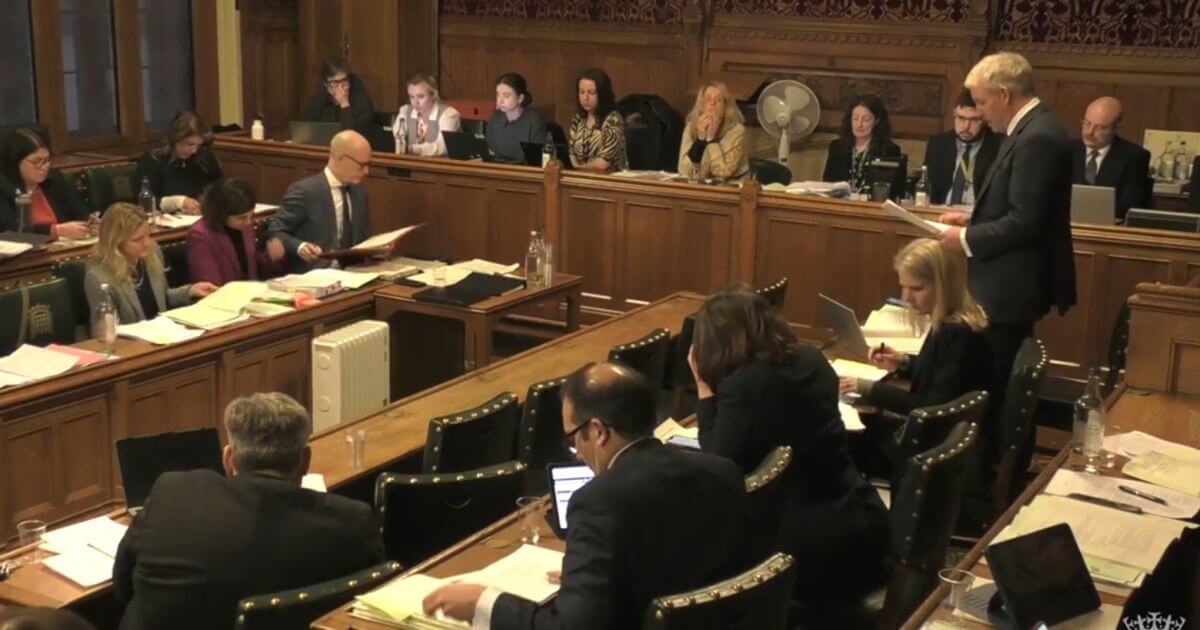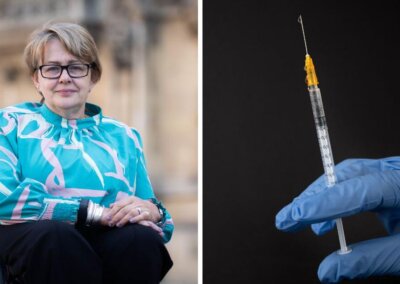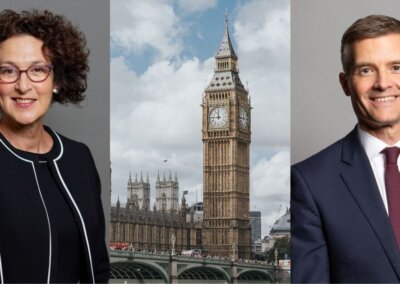The assisted suicide Bill Committee scrutinising Kim Leadbeater’s Terminally Ill Adults (End of Life) Bill, which passed its Second Reading on 29 November 2024, met earlier this month to begin its line-by-line scrutiny of the Bill.
On 11 and 12 February, MPs began to examine the clauses of the Bill along with the 362 amendments that had been tabled by the beginning of the week. Although the media were informed the evening before the Committee began scrutinising the Bill in detail, Leadbeater’s own amendment to remove the ‘High Court Judge safeguard’ was not published until Thursday night, when the Commons broke for the February recess.
The composition of the Committee, consisting of 14 MPs in favour of the Bill and nine against, has already been the subject of significant criticism, with some calling it a “complete stitch-up”.
During the scrutiny, a number of key themes emerged, demonstrating widespread concerns about many aspects of the Bill.
Is the Mental Capacity Act a sufficient tool for assisted suicide?
MPs from all three major political parties raised a series of concerns about whether the Mental Capacity Act was the right tool for determining whether someone can make the decision for assisted suicide.
Leading opponent of the assisted suicide Bill and Conservative MP, Danny Kruger, reminded the Committee that “It is the [Royal College of Psychiatrists’] view that the MCA [Mental Capacity Act] is not sufficient for the purposes of this [Leadbeater’s] Bill”.
Labour MP Naz Shah also pointed out that all three psychiatrists who gave oral evidence to the Committee expressed doubts about using the Mental Capacity Act in the context of assisted suicide.
Liberal Democrat MP Sarah Olney pointed out that most of the experts who gave oral evidence cast doubt on the Mental Capacity Act’s sufficiency to determine someone’s capability to opt for assisted suicide.
The notable exception in this regard came from Sir Chris Whitty who said in January that there “is an absolute expectation within the [Mental Capacity Act], for example, that the more serious the decision, the greater the level of capacity that someone needs to have”.
However, last week, the Chief Medical Officer admitted he had made a mistake in this regard after senior barrister Alex Ruck Keene KC pointed out it was “not accurate”.
Kruger said “The clarification comes too late for MPs who voted against our amendments based on his assertion that the MCA explicitly requires a higher degree of capacity for a more serious decision. As he admits, it doesn’t”.
Labour MP Sean Woodcock reminded the Committee that the Royal College of Psychiatrists warned mental capacity can change – making the Mental Capacity Act unsuitable for this Bill.
Fellow Labour MP Daniel Francis also questioned whether the Mental Capacity Act was ever designed for something as significant as assisted suicide. He said “The Mental Capacity Act is written to enable people to carry out day-to-day scenarios, such as buying a coffee or doing their banking, so that they are not challenged in every transaction in their life. It is therefore a very low bar to be deemed to have capacity”.
Being a financial burden could be a reason for assisted suicide
MPs frequently returned to the topic of the motivation for assisted suicide, with those opposed to the Bill pressing for clarity on the sorts of motivations that are acceptable under the terms of Leadbeater’s Bill.
Kit Malthouse MP argued that ‘being a financial burden’ would not be a reason for a doctor to provide assistance in suicide, even while the clauses in the Bill are silent on the motivation for assisted suicide. As Danny Kruger MP, one of the Bill’s principal opponents, explained “there is no requirement for any causal link between the terminal illness and the desire to die. Under the Bill, someone’s reason for wanting to die does not need to be linked to the terminal illness; in fact, no reason is required. The Bill is totally neutral—in fact, it is silent—on the whole question of motivation”.
In a revealing exchange, Kruger asked Leadbeater whether she would “be content if somebody who had capacity chose an assisted death for the purpose of saving their family money?”. Leadbeater replied saying the situation was more complicated than he suggested.
He followed up by asking “If they have been judged to have capacity, choosing to have the assisted death in order to save their family money would be acceptable under her Bill, would it not?”.
Leadbeater again refused to rule out this possibility, saying that “We are oversimplifying a complex situation and a difficult conversation” and calling for “expertise” that would be achieved “by providing serious amounts of training around this issue”.
Pressing his point for the final time Kruger said “I want to hear the hon. Lady confirm that under the Bill as currently drafted, after all these conversations have taken place, as long as the doctor cannot find evidence of coercion, they would be obliged to approve the assisted death, as would the judge and the judicial panel. If that is the case, and they conclude that a person has capacity and there is no evidence of coercion, no matter what conversations go on—if the person wants to do it in order to save their family money—the doctors and the judges would have to say yes”.
After Leadbeater prevaricated once more, Rebecca Paul MP also attempted to elicit a specific response from the Bill’s sponsor on this point.
“[W]ould someone be allowed to access assisted dying if it was clear that they had capacity and their reason for it was simply not to cost their relatives financial expense or be a burden[?] It is important to be honest about what the Bill does. Is the answer to that yes?”.
In her answer, Leadbeater appeared to confirm that as long as the other criteria were met, if someone requested assisted suicide due to concerns about being a financial burden on relatives, this would be a legally acceptable reason for assisted suicide.
“Ultimately, it comes down to a question of autonomy, dignity and choice for patients, but they are not simple conversations”, she said.
Sarah Olney MP also raised the concern that, under the Bill, someone thought to be within six months of the end of their life would be able to receive assistance in suicide “because they are suffering from depression”.
Under questioning from Danny Kruger, pro-assisted suicide MP Dr Neil Shastri-Hurst suggested that if the terms of the Bill are met, depression ought not always to be a barrier to state assistance in suicide.
Coercion and undue influence
While MPs from all sides of the debate agree that coercion to assisted suicide should be prohibited and is something explicitly ruled out in the Bill, MPs disagreed about its precise meaning, its distinction from ‘undue influence’ and the nature of pressure from within a family that may not amount to coercion.
Kruger argued it is “possible to have undue influence without coercion or pressure being present” and said that part of the problem with the Bill is that while doctors should be looking for coercion, they are not looking for ‘undue influence’ of family members in someone’s decision for assisted suicide. “There is no obligation on the doctor to record that there has been undue influence or to push back, because at the moment, the doctor is looking only for evidence of coercion”, he said.
Speaking broadly about the subtlety of influence among family members Kruger said “that power dynamics in families are complicated, and where there is an imbalance of power, there is risk. The Bill implicitly acknowledges that through the safeguards that it attempts to create, but I do not think they are strong enough”.
Fellow Conservative MP Rebecca Paul cited evidence from Emeritus Professor of Psychiatry, Allan House, and probate lawyer, Tamasin Perkins, highlighting the need for rigorous assessment by doctors to detect undue influence on those considering assisted suicide. This is an acute problem for couples seeking assisted suicide at the same time.
Paul also pointed out that when life support is withdrawn, ‘undue influence’ is considered. “[S]o when we are considering assisted death, surely, in order to be consistent, we would apply undue influence to that as well, rather than having a lower level. Why would we have a lower threshold for assisted dying compared with withdrawal of treatment?” she said.
Several MPs, including Paul, discussed the prevalence of coercion and the difficulty in detecting it. Paul struggled to believe the practitioners of assisted suicide/euthanasia who gave evidence to the Committee in January, who said there were no cases of coercion. While not doubting their testimony, she implied that there may have been coercion that they simply did not detect.
Kruger said that one in six older people are subject to elder abuse, and asked Leadbeater whether she thought that GP Simon Opher MP always spotted every single case of coercion.
Labour MP Naz Shah was especially concerned about vulnerable women being coerced into having assisted suicide saying: “I would rather stay on the side of caution… when it comes to domestic abuse, coercion, and the power imbalance in a relationship”. She also argued that where there is power, control and vulnerability, abuse can thrive.
Encouragement to suicide
MPs discussed a series of amendments seeking to strengthen safeguards to ensure a person’s decision to end their own life is not subject to more subtle forms of coercion such as “undue influence”, “encouragement” or “manipulation”.
Notably, during the debate, the Bill’s sponsor Kim Leadbeater as well as lead assisted suicide campaigner Kit Malthouse – both, apparently inadvertently – drew attention to the fact that the point at which supporting someone in suicide ends and the point at which encouragement begins is virtually impossible to pinpoint. Leadbeater said that ‘supporting’ someone to do something would fall under a certain understanding of ‘encouragement’, and asked “Where is the line between encouragement and support?”, implying that there was no clear line. At the same time, Malthouse also raised the issue that there may not be a meaningful difference between ‘supporting’ suicide and encouragement to suicide.
Among those opposed to the legislation, Naz Shah commented on the subtlety of encouragement and Kruger suggested that were a patient to say they had been encouraged in assisted suicide, this should be a “red flag” that ought to be sufficient to conclude that their decision was not made autonomously.
Indicating the confused nature of the discussion, Labour MP Daniel Francis said his understanding was that “it would be an offence under the Suicide Act to encourage a loved one to commit suicide when they have nine months left to live but that it would not be an offence under the Bill to encourage a loved one to take assisted death when they have six months left to live”.
However, Danny Kruger explained that the assisted suicide Bill apparently continues to view encouragement to suicide as criminal in both assisted and unassisted circumstances and that the purpose of amendments was to ensure doctors were on the lookout for encouragement to suicide.
No impact assessment and questions about Government neutrality
Throughout the two-day discussion, MPs frequently raised their concerns about the lack of an impact assessment, the neutrality of the Ministers sitting on the Committee, and a range of additional procedural issues.
Naz Shah raised the issue more than once, asking how any of the aspects of this Bill can be settled when there has been no impact assessment and no consultation on this Bill. “I struggle to understand how the Minister and the Government can say that this is a settled position without having gone to consultation on the Bill and without having an impact assessment”.
Sarah Olney MP also noted the lack of an impact assessment and questioned Minister Stephen Kinnock: “Does [the Minister] not accept that it would have made sense to have done it before the Committee stage? Then, any evidence that the assessment threw up could have given rise to amendments tabled during the Committee stage—that would have made it an appropriate time to have done the impact assessment”. She also asked how proper scrutiny can take place “when new amendments are being tabled at the last minute that potentially change the entire nature of the legislation that we are attempting to scrutinise?”.
Labour MP Sean Woodcock made the same point and Kruger also raised this concern, at one point asking “Why on earth do we not have an impact assessment, which could advise the members of the Committee and the Government themselves on the appropriateness of the measures?”.
Kruger also raised a series of other concerns about the process of the Bill and suggested delaying further discussion given the fact that Leadbeater had introduced a significant amendment only hours before the Committee sat.
Kruger also railed against the Government’s supposed neutrality with regard to the Bill saying “I simply do not understand what on earth the Minister means when he says that he is neutral about the clauses. He has just given the view, from his position, that he objects to the amendment and that he supports the use of the Mental Capacity Act. He is basing his view— I had understood that, as a neutral member of the Committee, he was not going to express one—on something. What is he basing it on? Secondly, how can he express a view when he is supposed to be neutral?”.
He also said he was “confused by this Jekyll and Hyde character [of the Ministers]. They seem to have two personalities on the Committee, voting as private Members but speaking as Ministers. I wonder whether there is any precedent for that in any private Member’s Bill, or indeed any Bill, and whether Parliament admits the split personas that they have”.
Assisted suicide vs assisted dying
MPs supportive and opposed to the assisted suicide Bill consistently disagreed about the use of terminology, in particular, the classification of ‘assisted dying’ as a form of suicide.
During one exchange in which Leadbeater disputed the use of the term ‘suicide’ in relation to her Bill, claiming that it “is not accurate for the cases we are talking about” and that the “people we are dealing with are not suicidal”, Kruger had to remind her that “we are actually amending the Suicide Act 1961 – or rather, we are disapplying that Act – in the process set out in [her] Bill”.
Naz Shah made the same point saying “We have to use the word “suicide” because we are amending the Suicide Act 1961”.
At one point during the debate, pro-assisted suicide MP Kit Malthouse tried to redefine ‘suicide,’ claiming it “is a healthy person taking their life”.
However, Rebecca Paul insisted on the use of the term ‘suicide’ in relation to what the Bill aims to make legal.
“First, I am saying ‘suicide’ because we are talking about the Suicide Act, and I cannot perform this role without naming the actual bit of legislation that we are talking about. I know people here are a little bit squeamish about the word ‘suicide’, but it has a clear legal meaning”.
“It has a clear legal meaning, and we must not put the blinkers on. I would suggest to Members that if they have an issue with the word ‘suicide’, they remember that this will actually result in the end of someone’s life. We must not be squeamish about using correct and accurate terminology in what we describe”.
Should assisted suicide be accessible to prisoners and homeless people?
Danny Kruger proposed an amendment to protect homeless people and people in prison from assisted suicide, which was ultimately rejected by MPs on the Committee.
Kruger pointed out that prisoners often resort to self-harm and suicide, and were some of the “most disadvantaged people in our country”. He said that suicide is the second leading cause of death in prisons, and that offering assisted suicide “to prisoners would be fraught with hazard”.
Naz Shah MP revealed her tragic personal story of her mother being imprisoned for 14 years, experiencing homelessness, attempting suicide, and surviving domestic abuse. She said that the suicide rate is nearly 10 times higher in prisons, and 1/3 of female prisoners are self-harming in England and Wales.
At the same time, pro-assisted suicide MPs redefined assisted suicide as “treatment” and “healthcare”, with Minister Stephen Kinnock saying it would be illegal to deny prisoners the same “treatment” as those not in prison. However, Naz Shah corrected the Minister saying that assisted suicide is not actually a “treatment” since it does not treat any disease or illness – it simply ends a life.
Danny Kruger revealed shocking data from Ontario, Canada – homeless people are disproportionately likely to receive assisted suicide. “One woman had struggled to find a suitable accommodation for her medical needs while her suffering worsened by loneliness and isolation. She applied for and received an assisted death”.
He also cited polling showing that 6% of people in the UK support assisted suicide for those who are homeless. “In Canada, which has had assisted dying for some years now, more than a quarter of people agreed that it should be offered to people who are homeless. Indeed, a quarter believed that it should be allowed for people who are just poor and want it”, he said.












